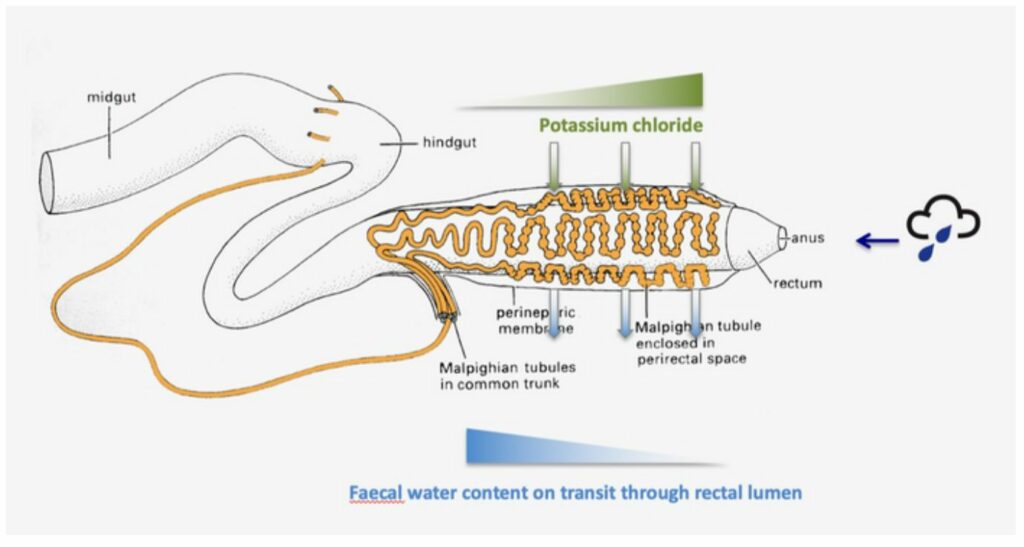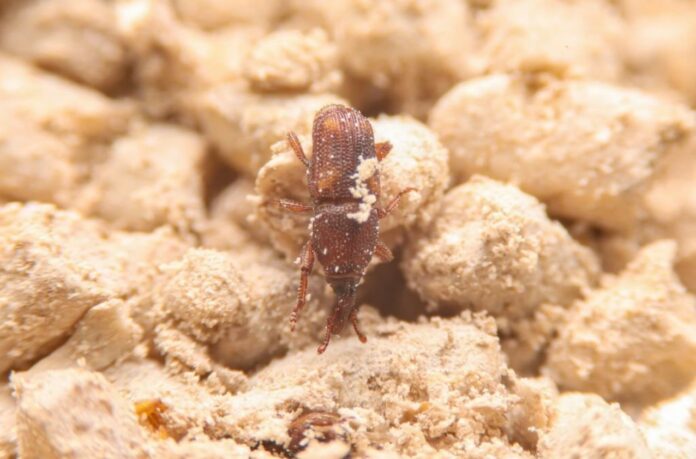A recent study conducted by researchers from the University of Copenhagen and the University of Edinburgh sheds light on how beetles use their rear ends to stay hydrated in extremely dry environments.
This unique ability enables beetles to thrive in conditions that would be inhospitable to many other creatures.
The findings could potentially be applied to develop more targeted and precise methods for controlling global pest populations such as the grain weevil and red flour beetle.
Every year, insect pests consume thousands of tons of food globally, causing significant food security issues, particularly in developing nations. The grain weevil and red flour beetle are two animal species that specialize in surviving in extremely dry environments, including granaries, and have done so for thousands of years.
A recent study conducted by the Department of Biology at the University of Copenhagen delves into the molecular and physiological processes that enable beetles to survive their entire lives without drinking any liquid water. The study reveals that one of the secrets to this ability lies in the beetles’ rear ends. By opening their rectums, they can extract water from moist air and convert it into fluid that they can absorb into their bodies. While scientists have been aware of this unique approach to water consumption for over a century, the recent study sheds new light on the underlying mechanisms involved.
To gain insights into the water-absorbing abilities of red flour beetles, the researchers examined the internal organs of these beetles. Red flour beetles are considered “model organisms” because they are easy to work with and share biological similarities with other beetle species.

Through their investigation, the researchers discovered a gene expressed at sixty times higher levels in the beetle’s rectum than in other parts of its body. This gene led them to a distinct group of cells called leptophragmata cells, which play a crucial role in the beetle’s water absorption process through its rear end.
According to Associate Professor Kenneth Veland Halberg, who led the study, the leptophragmata cells are small cells positioned like windows between the beetle’s kidneys and its circulatory system or blood. These cells are essential in the beetle’s ability to absorb water rectally. As the beetle’s kidneys surround its hindgut, the leptophragmata cells pump salts into the kidneys, allowing them to extract water from moist air through the rectum and into the beetle’s body. The newly discovered gene is crucial to this process.
Apart from extracting water from the air, beetles are highly efficient at obtaining liquid from their food. They can even extract fluid from dry grains, which may contain only 1-2% water, to help maintain their fluid balance.
“A beetle can go through an entire life cycle without drinking liquid water,” remarks Kenneth Veland Halberg.
Beetles are adept at extracting water from their food and the air, thanks to their specialized multi-organ system consisting of a modified rectum and closely located kidneys. This system is highly effective in extracting water, as evidenced by the dry and waterless stool samples the researchers examined, according to the author.
Beetles have thrived on Earth for the past 500 million years, with one out of every five animal species being a beetle. However, some types of beetles, such as the red flour beetle, grain weevil, confused flour beetle, and Colorado potato beetle, have become notorious pests that pose a significant threat to global food security. These pests can infiltrate up to 25 percent of the world’s food supply annually, and we currently spend around $100 billion on pesticides to protect our food. Unfortunately, conventional pesticides are harmful to other living organisms and have negative impacts on the environment.
Associate Professor Kenneth Veland Halberg believes that developing more targeted and environmentally friendly insecticides is crucial. These insecticides should only target insect pests while sparing beneficial insects, like bees. Therefore, a deeper understanding of beetle anatomy and physiology, as obtained through the research on beetles’ water-absorption process, could be a crucial factor in developing more effective and eco-friendly insecticides.
“Now we understand exactly which genes, cells and molecules are at play in the beetle when it absorbs water in its rectum. This means that we suddenly have a grip on how to disrup these very efficient processes by, for example, developing insecticides that target this function and in doing so, kill the beetle,” adds Kenneth Veland Halberg.
“There is twenty times as much insect biomass on Earth than that of humans. They play key roles in most food webs have a huge impact on virtually all ecosystems and on human health. So, we need to understand them better.”
Image Credit: Getty
